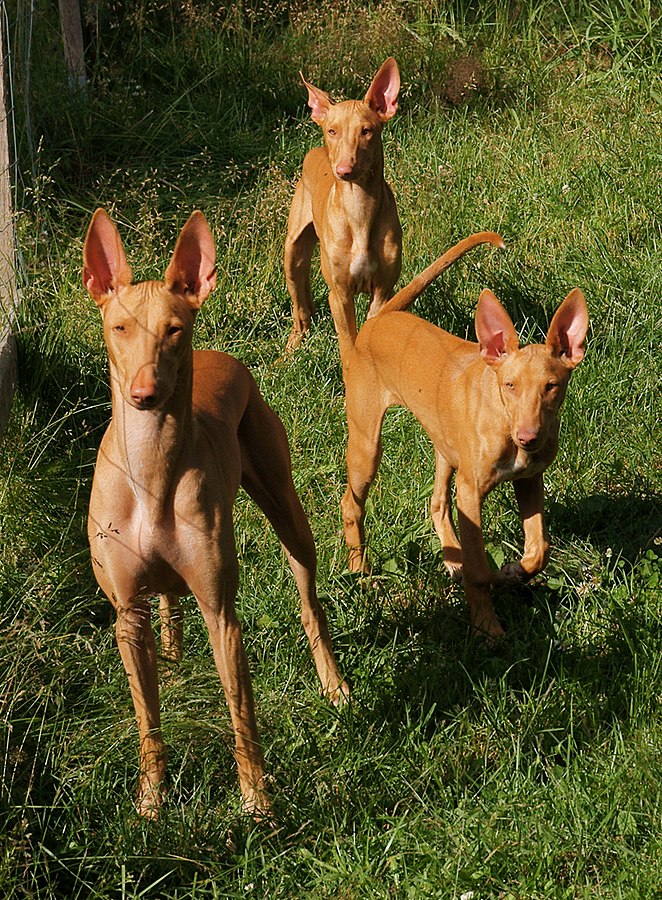The Pharaoh Hound is thought to be one of the oldest breeds of domesticated dog. His appearance has not changed much since ancient times, as most breeders want to retain their natural beauty. This sighthound also has a great sense of hearing and smell and is very versatile, with the capability to do many different activities. The outgoing breed loves to be outdoors enjoying a jog or game of fetch with their owners! This said, they are also gentle and sensitive and must always be treated fairly. One of the unique traits of this breed is that, when excited, they will smile and even blush!
Unlike some sighthounds, Pharaohs are very active and tend to have a lot of energy. One cannot just put them in the backyard and let them “run off some steam”. Instead, they need regular structured exercise and play with their owner. While free-running in a yard is important, it cannot substitute for walking or jogging. These dogs are very people-oriented and need to spend lots of quality time with the humans in the household. Very affectionate, males are more laid back while females tend to be a bit more independent. Their activity level combined with their propensity for mischief does not make them suitable for first-time dog owners.
Pharaohs love to play and to entertain their owners – so much so that they have been called the “jester of the canine world”, but a bored Pharoah can become mischievous and will invent his own games. These games might include ripping up his bedding, digging large craters in the yard or counter-surfing, so it is important to give the dog enough mental and physical stimulation to prevent these obnoxious behaviors. Obedience training is a great way to do this, although potential owners should be aware that this breed was developed to be independent, and therefore might not take as easily to training as a Border Collie or Golden Retriever. Lots of positive reinforcement and motivation will probably be required in order to hold the dog’s attention! They tend to shut down when only negative reinforcement is used.
Pharaohs are not considered quiet dogs – they do like to bark! This makes them good watchdogs, although they will not back up their bark with a bite. These are not guard dogs by any means. They will bark when they play (a pastime that they love), bark when anything looks out of the ordinary and bark whenever they hear a sound. This makes them ill-adept at living in most apartments. Another con for apartment-living is that they tend to get very excited several times a day and whisk around the house like little whirlwinds! This can be difficult when living in a small space. The older the dog gets, the less often he will go into these zoomie-fits but most of these dogs are very slow to fully mature. When not zooming around, the breed tends to plant themselves on the couch and chill until the next burst of energy.
Originally bred to hunt down rabbits, the Pharaoh has a high prey drive and will chase most things that move – even grabbing birds out of the air! This instinct is so strong that these hounds will need to be kept on-leash at all times that they are not in a safely fenced area. A fenced yard is also required by most breeders for the same reason, at least 6 feet high in order to curtail their jumping. They can live with cats although the best results are when the dog is raised with cats from puppyhood. Many recommend to never leave the two alone together – always supervising their interaction. By no means should the dog ever be allowed to chase the cat, even if it seems funny or cute at the time. Most will still go after a cat that gets outside, including neighborhood cats that make the unlucky mistake of coming into the yard with a Pharaoh…
Pharaohs get along wonderfully with children, although supervision is also recommended if the child is very young. Their sensitive nature makes this sighthound skittish around sudden movements and they will get spooked if suddenly hit or surprised by a toddler. They are a much better match for slightly older kids who will run and play with them. As far as other dogs, many Pharaohs get along famously with other dogs, usually accepting a new canine members of the family very quickly. One caveat – some tend to play rough and might accidentally hurt a much smaller dog. Tiny breeds might not make the best match.
These short-haired dogs came from desert areas and don’t always handle cold very well. They should be given coats whenever they are outside in chilly weather. Some owners even buy them pajamas to wear on cold nights, although snuggling underneath a blanket probably works just as well! Despite these minor inconveniences, their short coat means that they are very easy to groom and rarely require baths. They have little doggy odor and tend to keep themselves pretty clean. Cleaning their ears and keeping their nails trimmed short is the bulk of the grooming work, although most enjoy a rub down with a damp cloth every now and again to pull out loose hairs. Bathe when necessary. Extra bonus – they rarely shed!
These beautiful dogs are naturally very thin – and the appearance of ribs is normal in a healthy Pharaoh. Other distinguishing features include their large size, always-tan coloration (anywhere from chestnut to a rich red) and the large erect ears. The ears should never be cropped – they stand up this way naturally. While the dog can have tiny white markings on the tail, chest, feet or face, this is the extent to which the dog can be marked.

Photo By kallerna
